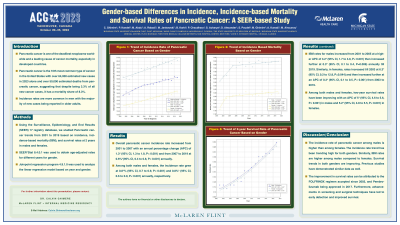Sunday Poster Session
Category: Biliary/Pancreas
P0036 - Gender-Based Differences in Incidence, Incidence-Based Mortality and Survival Rates of Pancreatic Cancer: A SEER-Based Study
Sunday, October 22, 2023
3:30 PM - 7:00 PM PT
Location: Exhibit Hall

Has Audio

Calvin Ghimire, MD
Michigan State University/McLaren Flint Hospital
Flint, MI
Presenting Author(s)
Calvin Ghimire, MD1, Pujan Kandel, MD2, Manasik Abdu, MD3, Alexander Rabadi, MD4, Matthew Jankowski, MD1, Bibek Karki, MD5, Pradip Chaudhary, MD5, Sajan Acharya, MD6, Dheeraj Alexander, MD4, Sajana Poudel, MD7, Manoj Ghimire, MD8, Arvind Kunadi, MD4, Mustafa Alnounou, MD, FACG4
1Michigan State University/McLaren Flint Hospital, Flint, MI; 2Mayo Clinic, Jacksonville, FL; 3University at Buffalo-Catholic Health System, Buffalo, NY; 4McLaren Flint Hospital, Flint, MI; 5Hurley Medical Center, Flint, MI; 6New York Medical College, New York, NY; 7John H. Stroger, Jr. Hospital of Cook County, Chicago, IL; 8Mayo Clinic Florida, Jacksonville, FL
Introduction: Pancreatic cancer is one of the deadliest neoplasms worldwide and a leading cause of cancer mortality, especially in developed countries. Pancreatic cancer is the 10th most common type of cancer in the United States with over 64,000 estimated new cases in 2023 alone and over 50,000 estimated deaths from pancreatic cancer, suggesting that despite being 3.3% of all new cancer cases, it has a mortality share of 8.3%. Incidence rates are more common in men with the majority of new cases being reported in older adults.
Methods: Using the Surveillance, Epidemiology, and End Results (SEER) 17 registry database, we studied Pancreatic cancer trends from 2001 to 2019 based on incidence, incidence-based mortality (IBM), and survival rates at 2 years in males and females.SEER*Stat 8.4.0.1 was used to obtain age-adjusted rates for different years for gender. Joinpoint regression program 4.9.1.0 was used to analyze the linear regression model based on year and gender.
Results: Overall pancreatic cancer incidence rate increased from 2001 to 2007 with an annual percentage change (APC) of 1.3* (95% CI, 1.3 to 1.8, P< 0.001) and from 2007 to 2019 at 0.6*(95% CI, 0.4 to 0.8, P< 0.001) annually.
Among both males and females, the incidence rate grew at 0.8* (95% CI, 0.7 to 0.9, P< 0.001) and 0.8* (95% CI, 0.6 to 0.9, P< 0.001) annually, respectively.
IBM rates for males increased from 2001 to 2005 at a higher APC of 3.2*(95% CI, 1.7 to 4.8, P< 0.001) then increased further at 0.3* (95% CI, 0.1 to 0.4, P=0.006) annually till 2019. Similarly, in females, rates increased till 2003 at 6.3* (95% CI, 0.2 to 12.8, P=0.044) and then increased further at an APC of 0.3* (95% CI, 0.1 to 0.5, P< 0.001) from 2003 to 2019.
Among both males and females, two-year survival rates have been improving with an APC of 5* (95% CI, 4.6 to 5.6, P< 0.001) in males and 5.2* (95% CI, 4.8 to 5.5, P< 0.001) in females.
Discussion: The incidence rate of pancreatic cancer among males is higher than among females. The incidence rate trend has been trending high for both genders. Similarly. IBM rates are higher among males compared to females. Survival trends in both genders are improving. Previous studies have demonstrated similar data as well. The improvement in survival rates can be attributed to the FOLFRINOX regimen accepted since 2003, and Pembrolizumab being approved in 2017. Furthermore, advancements in screening and surgical techniques have led to early detection and improved survival.

Disclosures:
Calvin Ghimire, MD1, Pujan Kandel, MD2, Manasik Abdu, MD3, Alexander Rabadi, MD4, Matthew Jankowski, MD1, Bibek Karki, MD5, Pradip Chaudhary, MD5, Sajan Acharya, MD6, Dheeraj Alexander, MD4, Sajana Poudel, MD7, Manoj Ghimire, MD8, Arvind Kunadi, MD4, Mustafa Alnounou, MD, FACG4. P0036 - Gender-Based Differences in Incidence, Incidence-Based Mortality and Survival Rates of Pancreatic Cancer: A SEER-Based Study, ACG 2023 Annual Scientific Meeting Abstracts. Vancouver, BC, Canada: American College of Gastroenterology.
1Michigan State University/McLaren Flint Hospital, Flint, MI; 2Mayo Clinic, Jacksonville, FL; 3University at Buffalo-Catholic Health System, Buffalo, NY; 4McLaren Flint Hospital, Flint, MI; 5Hurley Medical Center, Flint, MI; 6New York Medical College, New York, NY; 7John H. Stroger, Jr. Hospital of Cook County, Chicago, IL; 8Mayo Clinic Florida, Jacksonville, FL
Introduction: Pancreatic cancer is one of the deadliest neoplasms worldwide and a leading cause of cancer mortality, especially in developed countries. Pancreatic cancer is the 10th most common type of cancer in the United States with over 64,000 estimated new cases in 2023 alone and over 50,000 estimated deaths from pancreatic cancer, suggesting that despite being 3.3% of all new cancer cases, it has a mortality share of 8.3%. Incidence rates are more common in men with the majority of new cases being reported in older adults.
Methods: Using the Surveillance, Epidemiology, and End Results (SEER) 17 registry database, we studied Pancreatic cancer trends from 2001 to 2019 based on incidence, incidence-based mortality (IBM), and survival rates at 2 years in males and females.SEER*Stat 8.4.0.1 was used to obtain age-adjusted rates for different years for gender. Joinpoint regression program 4.9.1.0 was used to analyze the linear regression model based on year and gender.
Results: Overall pancreatic cancer incidence rate increased from 2001 to 2007 with an annual percentage change (APC) of 1.3* (95% CI, 1.3 to 1.8, P< 0.001) and from 2007 to 2019 at 0.6*(95% CI, 0.4 to 0.8, P< 0.001) annually.
Among both males and females, the incidence rate grew at 0.8* (95% CI, 0.7 to 0.9, P< 0.001) and 0.8* (95% CI, 0.6 to 0.9, P< 0.001) annually, respectively.
IBM rates for males increased from 2001 to 2005 at a higher APC of 3.2*(95% CI, 1.7 to 4.8, P< 0.001) then increased further at 0.3* (95% CI, 0.1 to 0.4, P=0.006) annually till 2019. Similarly, in females, rates increased till 2003 at 6.3* (95% CI, 0.2 to 12.8, P=0.044) and then increased further at an APC of 0.3* (95% CI, 0.1 to 0.5, P< 0.001) from 2003 to 2019.
Among both males and females, two-year survival rates have been improving with an APC of 5* (95% CI, 4.6 to 5.6, P< 0.001) in males and 5.2* (95% CI, 4.8 to 5.5, P< 0.001) in females.
Discussion: The incidence rate of pancreatic cancer among males is higher than among females. The incidence rate trend has been trending high for both genders. Similarly. IBM rates are higher among males compared to females. Survival trends in both genders are improving. Previous studies have demonstrated similar data as well. The improvement in survival rates can be attributed to the FOLFRINOX regimen accepted since 2003, and Pembrolizumab being approved in 2017. Furthermore, advancements in screening and surgical techniques have led to early detection and improved survival.

Figure: Trend of 2-year survival rates of pancreatic cancer based on gender
Disclosures:
Calvin Ghimire indicated no relevant financial relationships.
Pujan Kandel indicated no relevant financial relationships.
Manasik Abdu indicated no relevant financial relationships.
Alexander Rabadi indicated no relevant financial relationships.
Matthew Jankowski indicated no relevant financial relationships.
Bibek Karki indicated no relevant financial relationships.
Pradip Chaudhary indicated no relevant financial relationships.
Sajan Acharya indicated no relevant financial relationships.
Dheeraj Alexander indicated no relevant financial relationships.
Sajana Poudel indicated no relevant financial relationships.
Manoj Ghimire indicated no relevant financial relationships.
Arvind Kunadi indicated no relevant financial relationships.
Mustafa Alnounou indicated no relevant financial relationships.
Calvin Ghimire, MD1, Pujan Kandel, MD2, Manasik Abdu, MD3, Alexander Rabadi, MD4, Matthew Jankowski, MD1, Bibek Karki, MD5, Pradip Chaudhary, MD5, Sajan Acharya, MD6, Dheeraj Alexander, MD4, Sajana Poudel, MD7, Manoj Ghimire, MD8, Arvind Kunadi, MD4, Mustafa Alnounou, MD, FACG4. P0036 - Gender-Based Differences in Incidence, Incidence-Based Mortality and Survival Rates of Pancreatic Cancer: A SEER-Based Study, ACG 2023 Annual Scientific Meeting Abstracts. Vancouver, BC, Canada: American College of Gastroenterology.
